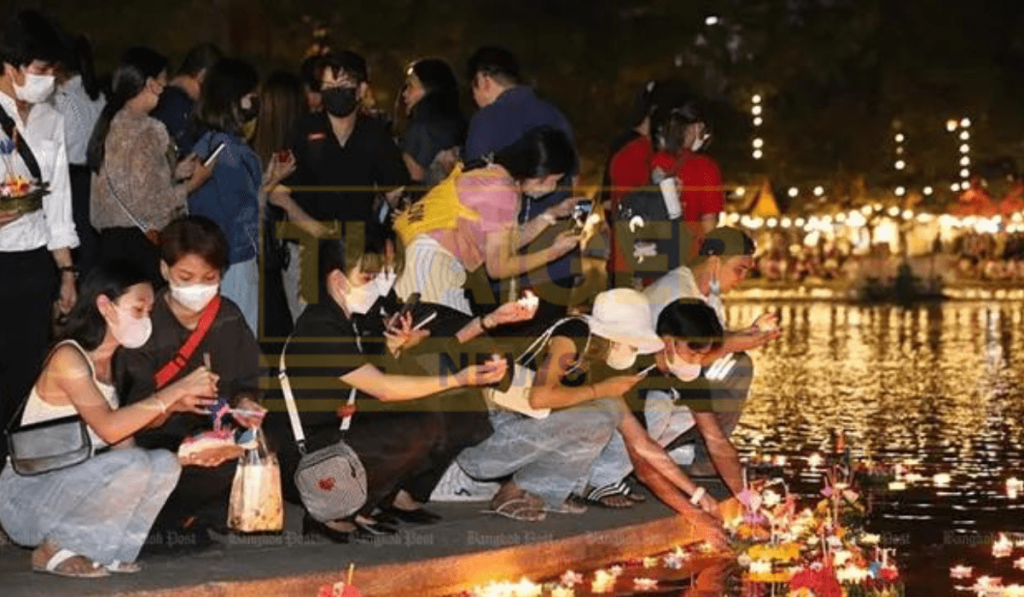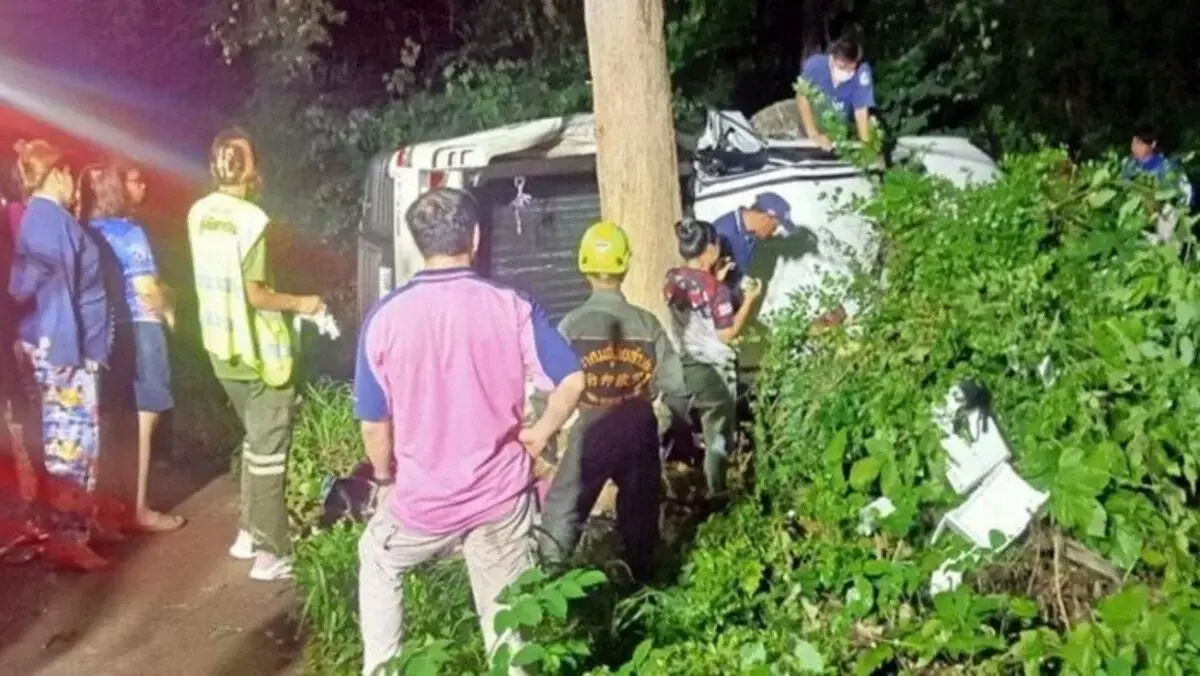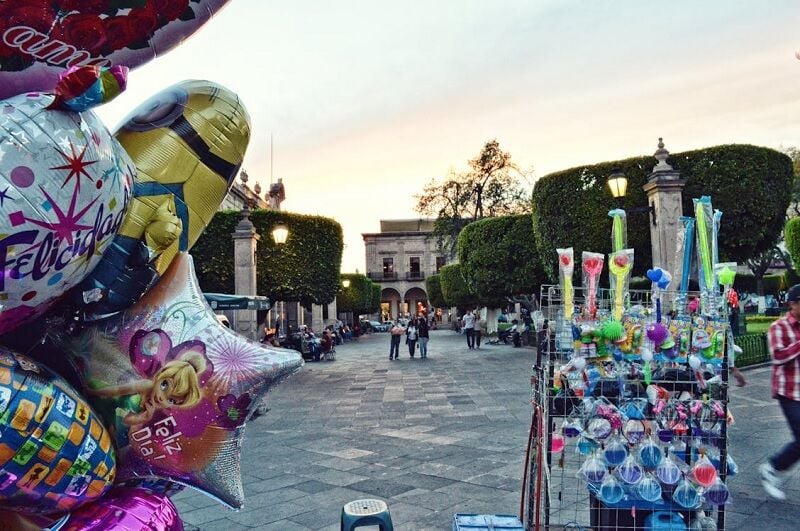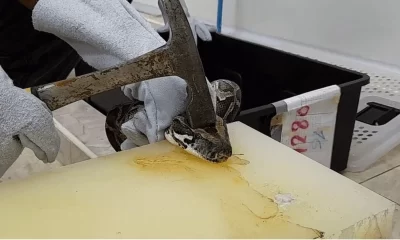News
Missing Buriram woman found after mysterious journey

In the heart of Buriram province, nestled within the vibrant tapestry of Thai culture, a family’s anguish finally gave way to tears of joy as their missing daughter, Jintana, returned home after an agonizing three-month disappearance. The narrative of Jintana’s journey, shrouded in mystery and driven by inner turmoil, unveils a poignant tale of resilience, community support, and the complexities of mental health.
It was the Loy Krathong festival in November when Jintana, a 22-year-old woman grappling with the shadows of depression, vanished without a trace. Her absence sent ripples of distress through her family, leaving them clinging to hope amidst the uncertainty that gripped their hearts. Yet, on a fateful day in March, Jintana emerged near a hospital in the Pakham district, reuniting with her overjoyed family and marking the end of a harrowing chapter.
Jintana’s journey, as she later recounted, was not one dictated by rationale but rather by ethereal whispers that beckoned her towards Sa Kaeo province. March 5th marked the commencement of her enigmatic odyssey, one that saw her traverse diverse landscapes astride her motorbike until fate intervened, rendering her vehicle immobile. Undeterred, she pressed on, borrowing a bicycle to continue her pilgrimage homeward.
The crux of Jintana’s saga lies in her battle with depression, a relentless adversary that besieged her mind for nearly a year. She spoke of hearing voices, disembodied yet commanding, compelling her to forsake the comforts of home. In her quest for solace, she found herself at the mercy of strangers, relying on their benevolence for sustenance and shelter as she sought refuge in pavilions and temples along her solitary path.
Amidst the labyrinth of her thoughts, Jintana’s maternal instincts emerged as a beacon of hope, tethering her to the memory of her seven-year-old child and the enduring love of her family. It was this tether that ultimately guided her back from the depths of her solitude, igniting a flicker of resolve amidst the darkness that threatened to consume her.
For Saengrawee, Jintana’s mother, the return of her daughter heralded a resurgence of hope amidst the shadows of despair. Her journey, marked by tireless searches and fervent prayers, bore witness to a mother’s unwavering devotion and an unyielding determination to reunite her family. Yet, it was not a journey devoid of uncertainty, for Jintana’s struggles with mental health had cast a pall of fear over their lives long before her disappearance.
The echoes of Saengrawee’s anguish reverberated through the community, mobilizing a network of community leaders and law enforcement officials in a unified effort to bring Jintana home. Their collective resolve served as a testament to the power of communal solidarity, transcending barriers of geography and circumstance in their quest for reunification.
The Struggle with Depression: Voices and Shadows

In the wake of Jintana’s return, the family’s jubilation was tinged with a sobering reality—the specter of mental illness loomed ominously, casting a shadow over their newfound happiness. Saengrawee, weary yet resolute, vowed to seek medical treatment for Jintana, recognizing the imperative of vigilance in safeguarding her daughter’s well-being.
As the curtains draw on Jintana’s odyssey, her story stands as a poignant reminder of the complexities of mental health and the indomitable spirit of the human heart. It is a testament to the resilience of the human spirit, buoyed by the unwavering support of loved ones and the guiding light of community solidarity.
The tale of Jintana serves as a beacon of hope, illuminating the path towards understanding and compassion in the face of adversity. It calls upon us to confront the stigma surrounding mental illness, fostering a culture of empathy and acceptance that transcends borders and boundaries.
In the embrace of her family, Jintana finds solace amidst the tumult of her inner turmoil, a testament to the enduring power of love and the resilience of the human spirit. As she embarks on the next chapter of her journey, she carries with her the collective hopes and dreams of those who stood by her side, a testament to the transformative power of community and the enduring strength of the human heart.
News
Pickup truck crash in Lampang kills one amid heavy rain

Due to heavy rain, a pickup truck returning from Chiang Mai skidded off the road and crashed into a tree in Thoen, Lampang.
Despite the efforts of rescue teams, a 50-year-old woman tragically lost her life.
The accident was reported to Thoen Police Station in Lampang at 6:50 PM yesterday, July 30.
The incident occurred on Phahonyothin Road, between kilometer markers 632 and 633, near the Mae Thot intersection in Thoen district.
Rescue units from Mae Thot, Lampang, Thoen, and Ombun Thoen were promptly dispatched to the scene.
Related News: Police arrest violent
Upon arrival, responders discovered a white, four-door Mazda pickup truck with a Surin registration overturned and severely damaged from colliding with a large roadside tree. Inside the vehicle, four injured individuals were trapped.
Rescue teams quickly extracted three injured and provided initial medical assistance before transferring them to a hospital.
However, a 50-year-old woman from the Na Pang subdistrict, Phu Phiang district, Nan province, who was seated in the back, sustained critical injuries and succumbed to them before she could be freed from the wreckage.
Initial investigations revealed that the group had traveled from Chiang Mai to Nakhon Pathom.
The accident occurred on a curved section of the road, worsened by wet and slippery conditions from the rain.
The vehicle lost control and crashed violently into the tree.
After extracting and treating the injured, the deceased’s body was transported to the hospital for further examination.
Police have launched a formal investigation into the accident. They are gathering evidence and statements from the injured to understand the exact circumstances leading to the crash.
The results of the investigation will guide necessary legal proceedings, reported KhaoSod.
Authorities advised.
“We urge all drivers to exercise extreme caution, especially in bad weather and on curved roads.”
News
Police arrest violent debt collector after tip-off in Bangkok

Police apprehended a member of a violent debt collection gang linked to the assault of a 73-year-old woman following a tip-off. He was caught while attempting to flee from a motel on the outskirts of Bangkok.
High-ranking police officials, including Thiti Sangsawang, Noppasin Poolsawat, and Thiradech Thamsuthee, along with a team of investigators, successfully arrested Kritchit, also known as 33-year-old Chit Thasala, from Nakhon Si Thammarat Province today, July 30.
He is one of the three members of the gang responsible for violent debt collection activities, including physical assault, intimidation, kicking doors, cutting off electricity, and locking debtors inside their homes.
The Min Buri Criminal Court issued an arrest warrant for Kritchit on July 23 for operating an unauthorized personal loan business, charging excessive interest, and threatening debt collection practices.
Related News: Thai vendor denies
He was apprehended at a hotel in the Saphan Sung district as he tried to escape in his car. During interrogation, Kritchit denied all charges, stating he had only completed Grade 9 and initially worked as a fruit farmer in Phuket’s Thalang District. In 2022, he sold his orchard land and used the proceeds to start a money-lending business.
He collaborated with two other suspects, Ta and Khet, who are still at large, to lend money in the Min Buri, Ram Inthra, Rom Klao, and On Nut areas.
They charged an interest rate of 20% daily, with borrowers typically taking out 5,000 to 6,000 baht loans. Kritchit claimed that Ta and Khet were responsible for using violence against the debtors on the day of the incident.
“I only worked with Ta and Khet to lend money. They were the ones who used violence.”
However, police remain skeptical of his testimony. Investigations revealed that Kritchit is romantically involved with the younger sister of Kenwit, another gang member who was previously arrested for assaulting the older woman.
Kenwit’s gang had attacked the 73-year-old in the Chokchai area. After receiving a tip-off, Kritchit fled to the hotel, where he was captured.
Police have transferred Kritchit to the Min Buri Police Station for further legal proceedings. His capture is a significant breakthrough in the ongoing crackdown against violent debt collection gangs operating in Bangkok and nearby areas.
As one of the lead investigators remarked, we are committed to cracking down on these illegal activities and ensuring the safety of our citizens.
Kritchit’s case will proceed through the legal system, and police are continuing their search for the remaining gang members, Ta and Khet. The investigation remains ongoing, with police hopeful that further arrests will follow, dismantling the entire network of violent debt collectors, reported Khaosod.
News
Thai vendor denies assault, cites stress from poor sales

A Thai grilled squid vendor turned himself in and expressed remorse after allegedly striking a Pattaya city official who requested him to move his sidecar motorcycle from obstructing traffic.
The vendor, however, denied the physical assault, citing stress from poor sales as the trigger for the incident. He claimed their encounter was limited to a verbal disagreement and a shirt tug.
Pattaya police yesterday, July 29, invited Siwachett Nakham, a 42-year-old former temporary employee at the government’s Public Works Department and a current grilled squid vendor, to meet with an investigator to address the dispute.
Related News: Legend enjoys spring
The altercation involved Siwachett and a 40-year-old Pattaya city official, Udon Woranam, who had requested Siwachett to move his vehicle, blocking traffic near Jomtien Beach in front of the Dongtan Police Box. Siwachett was accused of punching Udon after the latter politely asked him to move his motorcycle. Siwachett, who acknowledged being the person in the video, denied the physical assault, maintaining that he only had a verbal confrontation with Udon and tugged his shirt.
He cited stress from poor sales and financial burdens as the reasons behind his behavior.
“I did not intend to harm Mr Udon because I had worked with the Public Works Department before, so I knew hitting an official was a bad idea.”
Siwachett apologized for his actions, and Udon said he did not wish to pursue the matter further. Despite this, Pattaya City insisted on taking legal action against the vendor to set a precedent and deter similar future incidents.
Selling goods
Additionally, Udon advised other vendors to remain calm, control their emotions, and adhere to the designated areas for selling their goods according to the law.
Following resolving this dispute, traffic police officers from Pattaya Police Station raided vendors illegally selling goods on public sidewalks and roads around Pattaya. This operation was in response to tourists’ complaints about obstructions and hazards caused by unorganized vendors.
When authorities arrived near Pattaya Police Station’s Dong Tan substation, they encountered heavy traffic congestion caused by street vendors parking on the road. Some vendors attempted to evade arrest by speeding through the officers’ blockade, putting the safety of officers and nearby individuals at risk.
Thai police managed to apprehend 12 vendors, who will now face legal proceedings for violating traffic and cleanliness laws. The police also announced plans to increase daily inspections in collaboration with municipal officials to restore public spaces for residents and tourists, reported the Pattaya News.
-

 News1 year ago
News1 year agoMICE industry must prioritise people management to sustain growth
-

 Entertainment2 years ago
Entertainment2 years agoDark history to exotic delights: Cambodia and Thailand tourist strategy
-

 Entertainment2 years ago
Entertainment2 years agoJohn Legend enjoys spring break in Phuket
-

 Entertainment2 years ago
Entertainment2 years agoSiam Paragon and Bangkok Pride proudly celebrates Pride Month from May 31 – June 4, 2024
-

 Entertainment2 years ago
Entertainment2 years agoPhuket’s Tourist Case court division resumes after four-year break
-

 Fashion2 years ago
Fashion2 years agoFed’s rate cut sends gold soaring past US$2,200 per ounce
-

 Fashion2 years ago
Fashion2 years agoGold prices in Thailand surge with ornaments at 37,350 baht
-

 Fashion2 years ago
Fashion2 years agoFashion brands linked to brutal slaughter of reptiles in Thailand (video)




